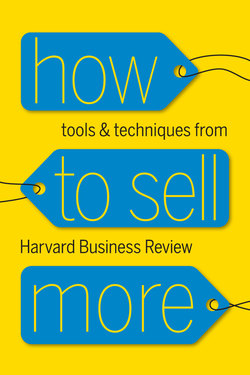Читать книгу How to Sell More - Harvard Business Review - Страница 7
На сайте Литреса книга снята с продажи.
The (New) Skills You Need to Succeed in Sales
ОглавлениеBy Lynette Ryals and Javier Marcos
Lynette Ryals is professor of strategic sales and account management at Cranfield University School of Management. Javier Marcos is a lecturer of sales performance at Cranfield’s Centre for Strategic Marketing and Sales.
The practice of business-to-business selling is in a curious state. On the one hand, commentators and academics are repeatedly telling us that transactional selling is outmoded and that relational selling is the “new normal.” On the other hand, most businesses are operating with traditional models of salesperson recruitment and training. The American Society for Training and Development (ASTD) estimates that in the U.S., $15 billion is spent per year on sales training. However, many salespeople find the training they receive either ineffective or less than useful. Given the importance of skills and capabilities to sales performance, businesses need to reconsider who they recruit into sales roles, and how they train them.
Put simply, we all tend to recruit people like ourselves. This in turn means that existing cultures, styles, and modes of behavior tend to perpetuate themselves. Trouble is, business-to-business selling has been undergoing a revolution. Traditional sales methods are increasingly unproductive. In fact, aggressive sales styles and product-focused selling are now so outdated that some customers are simply refusing to meet with salespeople using these techniques. These customers find it more pleasant and more efficient to order online, and who can blame them? Information about product and service features is increasingly available online, so salespeople find themselves in front of well-prepared customers. In this situation, focusing on product features in the sales meeting is a waste of everyone’s time. In fact, there is plenty of evidence that high-performing salespeople are those who listen and respond, who are flexible, and who think in terms of developing a solution to an emerging customer problem.
To find out what kind of people succeed in sales, and the kinds of skills they need to have, we carried out interviews with thought leaders in selling and sales management in the U.S. and the U.K. These included top sales leaders in major corporations, leading academics who have published in the sales field, and senior practitioners within sales associations or research-oriented sales consultancies.
Our research confirmed a growing trend: Salespeople today need to engage in collaboration with the customer but also increasingly with their own organization. Good selling is about transcending the customer-facing role and becoming an internal change agent as well.
Our thought leaders identified two major drivers for this change: The use of technology and changes in customer demands. Increased use of technology, they told us, means that online channels are substituting for traditional face-to-face meetings, and CRM systems are providing new insights into customers. On the customer side, our informants talked about ever-increasing customer expectations and more emphasis on return on investment and value. Our analysis revealed four categories of skills and capabilities that salespeople need in this new environment: Commercial, relational, managerial, and cognitive.
Commercial skills and capabilities are about financial insight, business acumen and customer insight—specifically, insight beyond what the customer has articulated. In complex relational sales, customers expect business-to-business salespeople to act as business consultants and demonstrate a broad strategic understanding of their organization and the impact on the customer’s bottom line of the solutions they sell.
Relational skills and capabilities include the ability to manage multi-level, multifunctional relationships, to understand relational dynamics and to inspire trust. Across all the research we have done in sales and key account management, trust is repeatedly cited by customers as important in their selection of a supplier.
Managerial skills and capabilities needed by people in sales roles include people management skills (because so much business-to-business selling is now done in teams and cross-functionally), high ethical standards and integrity (growing customer demands in relation to corporate social responsibility and ethics are changing selling behaviors), openness to change and adaptability, and influencing skills.
Cognitive skills and capabilities include innovative problem solving; the ability to identify opportunities, the ability to work under pressure, and mental toughness and resilience. These cognitive skills are important in a consultative selling role because the best future sales opportunities may be found within existing customers, not necessarily within new customers, and the salesperson needs the skills to recognize and develop these opportunities.
These skills and capabilities identified by our thought leaders have some clear consequences for the recruitment and training of salespeople in business-to-business consultative selling roles. Look again at the four elements: Traditional selling skills are conspicuous by their absence. In fact, the people best fitted to these new sales roles may not necessarily be people from a sales background. Instead, we see more people from technical or operations backgrounds such as project management, R&D, or supply chain moving into sales. They can be particularly adept at problem-solving and cross-functional working. Perhaps we should talk not about “salespeople” but about “people in a sales role.”
This broader view of the sales professional has implications not just for sales recruitment (“who”), but also for training and development (“what” and “how”). People in a sales role need a broad general management understanding that focuses on commercial, relational, managerial and cognitive capabilities. Sales leaders, HR directors, and CEOs need to ask some tough questions about how their organization is training its salespeople to develop these vital elements. Those responsible for commissioning, designing and/or delivering sales training must ensure that programs move beyond task-related knowledge and skills and emphasize a fuller range of general management competencies that are needed to manage increasingly complex markets and business relationships.
